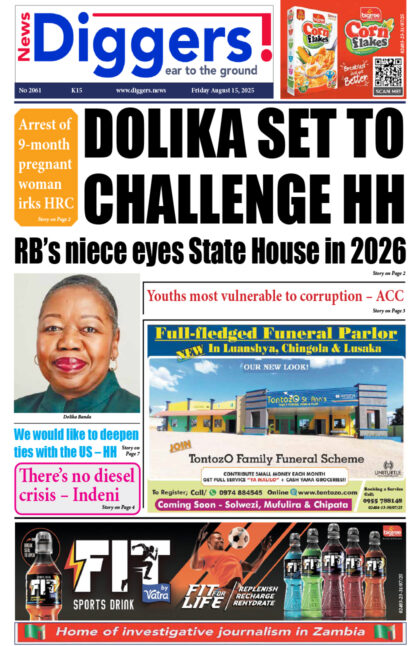THE LAW Association of Zambia (LAZ) says the Constitutional Court did not deal with the eligibility case of President Edgar Lungu.
And LAZ says there is no procedure that permits the government to publish, in the government gazette, different texts of a Bill to amend the Constitution, which has already passed through the stages as established by standing orders.
Responding to a press query, LAZ president Abyudi Shonga said the Constitutional Court (ConCourt) did not deal with any other eligibility criteria.
“It is the position of LAZ, according to the Constitution of Zambia as amended by Act No. 2 of 2016, the President of Zambia may only serve two terms. Further, it is LAZ’s position that there are several eligibility criteria for a person wishing to contest for the office of the President of the Republic of Zambia. One of the criteria is that the person must not have served two terms prior to attempting to contest. It is common knowledge that the Constitutional Court was called upon, in the cases of Reverend Danny Pule and others vs Attorney General and others, to determine whether President Edgar Lungu was eligible to stand for the office of the President of the Republic of Zambia in 2021,” Shonga said.
“Apart from a pronouncement that the presidential term served between the 25th of January, 2015 and the 13th of September, 2016 cannot be considered a full term, it is the position of LAZ that the Constitutional Court did not deal with any other eligibility criteria. Our opinion on the qualification or lack thereof of any potential candidate can only be based on the criteria passed by the law and on being presented with certain facts that may bring the qualification of such a candidate into question. The position as at now is that the only issue we are aware of is the issue of the full term which the court dealt with decisively in its judgement which is binding.”
And Shonga said the Constitution Amendment Bill Number 10 of 2019 could legally be tabled in parliament despite the lapse of 60 days.
“Parliament, through the standing orders committee, as well as the House Keeping Committee as set out in Standing Order No. 149 to 152, has the exclusive right to amend its own Standing Orders and make any adjustments as it wishes as per the doctrine of exclusive cognizance. According to Standing Orders 126 (1), a Bill which lapses by reason of prorogation before it reaches its final stage, may proceed within the next ensuing session at the stage it had reached in the preceding session, if a general election for the Assembly has not taken place between such two sessions. Therefore, the movers of the Bill can legally bring it back to Parliament despite the lapse of 60 days, as the Bill has no lifespan,’’ he said.
“In terms of procedure on the Minister of Justice publishing a Gazette Notice of the Constitution Amendment Bill number 10 of 2019, Order 99 of the National Assembly of Zambia, Standing Orders 2016, is instructive as it regulates the procedure of the National Assembly and its conduct of business, including stages of a bill. According to the Standing Order 99, a Bill to amend the Constitution cannot be passed unless at least thirty days before the first reading of the bill in the National Assembly, the text of the Bill is published in the Gazette and the Bill is supported on second and third reading by the votes of not less than two thirds of all members of the Assembly. When a Bill has been read the first time, it is committed to an appropriate committee for examination and at second reading, parliament proceeds to consider the Bill, taking into account the report of the Committee. Therefore, it is LAZ’s position that there was no procedure which permitted the government to publish, in the government gazette, different texts of a bill to amend the constitution which has already passed through the stages as established by standing orders. It is worth noting that when the right procedure is followed, a gazette bill may be introduced in parliament.”
Meanwhile, Shonga said the Association could not make a comment on the introduction of the statutory regulation self-regulation media Bill yet to be tabled in Parliament.
“Regarding the introduction of Statutory Regulation self-regulation media bill yet to be tabled in the next sitting of parliament, we are unable to offer LAZ’s position as we have neither had sight of the said Bill nor have been consulted by the relevant authorities,” said Shonga.
























